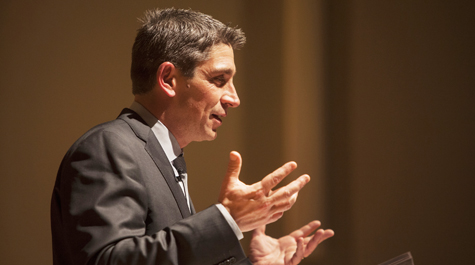Richard Blanco: Finding America through poetry
On Jan. 21, 2013, Richard Blanco became the fifth inaugural poet in American history, selected by President Barack Obama to be an honorary participant in a ceremony themed “Faith in America’s Future."
One month shy of his 45th birthday, he sat on the platform that day with his mother, who grew up in a dirt-floor home in Cuba, brought him to the United States when he was barely one month old, and “rang up groceries for 20 years so I could write this poem.”
After reading “One Today,” he returned to his seat. He doesn’t remember what Obama or Vice President Joe Biden said to him. What stands out about the moment is that he whispered to his mother, “Well, mom, I think we’re finally American,” and, for the first time, she agreed.
On Oct. 29 at William & Mary’s Commonwealth Auditorium, Blanco took an appreciative, mesmerized audience on an autobiographical journey that ended on that inaugural stage.
“I grew up in two lands: Cuba, this great paradise that we came from that we couldn’t go back to for some reason that I couldn’t understand,” he explained. “The other world that wasn’t so obvious was America. We liked to say that we liked living in Miami because it was so close to America – and you didn’t need a passport. Everyone in my community was Cuban.
“My version of America was what I saw on The Brady Bunch, Leave It to Beaver, and all those re-runs. I believed this idealized America really did exist, and Miami felt like a cultural purgatory, a waiting ground between the real-imagined Cuba and the real-imagined America, both of which I would hopefully get to someday.”
For as long as he could remember, the fundamental questions of who he was, where was home and where he belonged consumed him.
Blanco attacked those issues with poems of humor -- his family betting amongst themselves on a Miss America pageant, and his mother finally asking, “What is this . . . oh- Hi-yo?”
He addressed his concerns with an often wistful, longing and palpably painful introspection that allowed him to make good on his goal of “not throwing my poems at you, but (helping) you see something of your life, as well as mine.”
There was the poem “America” about the first time his family, fiercely resistant, celebrated Thanksgiving, American style. His mother supplemented their usual pork feast with a turkey, cranberry jelly and pumpkin pie. She made yams from a recipe he translated into Spanish for her from a bag of marshmallows.
“The turkey was passed around like a game of Russian roulette . . . pumpkin was a home remedy for ulcers, not a dessert,”
Later readings explored more of his family dynamics: his grandmother’s “Queer Theory” that Blanco was gay (he is) and her resulting advice to him.
“Don’t stare at the Six-Million Dollar Man ... I’ve seen you ... Never dance alone in your room.”
Another poem explored Blanco visiting his father in the hospital and later, imagining his father dreaming of his youth in Cuba, dancing with his equally young, beautiful wife.
“My mother’s face resting against his bare chest . . . the stars should still be turning around them.”
He told of taking his partner on an excursion to Marco Island, Fla., where his family vacationed at the Gulf Motel because they could rent a room in the then-desolate town for “100 bucks a week in the middle of July” and the proprietors didn’t care that they lugged in with them a week’s worth of food. But instead of being able to share a childhood memory, he found a gentrified “resort” whose endless rows of high-rise condos kept the beach in perpetual shade.
“(There was) this horrible feeling of having your life erased from the landscape, this emotional landscape that you have in your mind completely,” he said. “As I’ve read this more and more this year, I’ve found that everybody has their ‘Gulf Motel,’ this place that they just don’t want messed with.”
An engineer, he has taught at Georgetown and American universities and Central Connecticut State. Ultimately, though, he became famous as the first immigrant, first Latino and first gay person to present the inaugural poem.
“My very first writing assignment in my very first graduate writing course was – get this – to write a poem about America,” Blanco told a master’s class he taught earlier in the day, “which was exactly the same assignment Obama gave me. So when I heard the news, I was like, ‘Not worried, I got this’ -- for about five minutes.”















